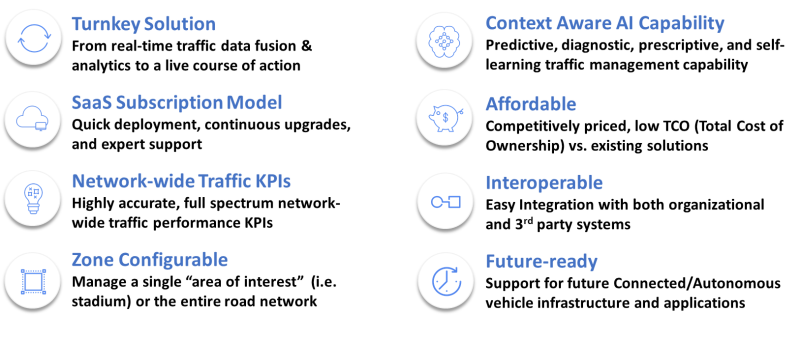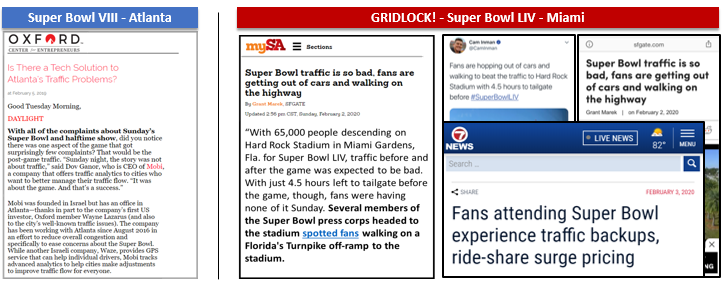
Mobi
432% of funding target
Highlights
Highlights
We all feel urban roads growing more congested every day – on our daily commute to work, on our way to a large event, even while waiting for a delivery. Mobility demand continues to rise, but unfortunately the capacity available on road networks to support it has fallen short – cities recognize they are not providing the quality of service necessary for their economies to thrive. With rising driver frustration, increasing economic loss from traffic jams, and diminishing air quality from vehicle emissions, transportation authorities have come to understand that building more roads is not the answer and offering alternative modes of transport is simply not enough – the only solution is for cities to fundamentally transform how traffic is managed across a road network. It’s about transforming traffic operations from simply reacting to congestion after its occurred to proactively monitoring the entire road network and predicting/preempting congestion from ever happening in the first place.
Mobi has developed a turnkey, AI-powered SaaS solution to drive this traffic transformation and enable cities to take back control of their roads. The company has proven commercial success operating in several cities around the world, is at the forefront of innovation in a market valued at tens of billions of dollars a year. Whether it’s understanding trip patterns and crowds forming to help the State of Israel slow the spread of the covid-19 virus or predicting and preventing vehicle congestion in Downtown Atlanta in the USA, Mobi is poised to revolutionize mobility for cities across the globe.
.png)
Mobi is focused on expanding its operations in the US market. The current fundraising round will allow it to close a large pipeline of customer opportunities in the US market. Closing these initial US customers will significantly increase the company's value and help complete an A round from a leading strategic investor within a year.
A Traffic Control Centers (TCCs) Digital transformation
Today, thousands of Traffic Control Centers (TCCs) operate within cities throughout the country where vehicle traffic is monitored, and decisions are made to manage traffic flow. Unfortunately, TCCs today have severely narrow situational awareness of traffic flow and have limited ability to detect congestion across the road network. They largely operate in “fire-fighting” mode by fetching traffic relief plans to reduce congestion after it’s already formed.
Current-State Traffic Control Center Operations

To make matters worse, TCCs have no ability to coordinate their traffic relief plans with other TCCs that also manage large segments of the same road network. Lastly, TCCs are unable to actively monitor and activate traffic relief plans for routinely congested zones inside their jurisdictions, including stadiums, seaports, airports, entertainment venues, etc.
Mobi is fundamentally transforming how TCCs function by 1) expanding situational awareness from vehicles only to all modes of transportation and 2) shifting operations from reactive to proactive traffic management.
Mobi AI-Powered Traffic Control Center Operations
.png)
Mobi does this by leveraging AI to 1) enable mobility insights across travel modes 2) improve traffic flow performance insights 3) predict where/when congestion and gridlock will occur, and 4) prescribe targeted traffic relief plans that significantly reduce and prevent traffic congestion. Our platform operates in real-time and can be applied to actively manage traffic flow for a small area of interest or an entire city, metro-area, or state. The platform also empowers multiple TCCs utilizing it to better coordinate their traffic relief plans between each other - a capability that simply does not exist at all today.
Analysis conducted by Prof. Haim Aviram for the Israel Ministry of Transport and Road Safety determined that for every NIS invested in Mobi's platform, transportation agencies saves a significant portion from its budget and the public saves through reduced travel time, reduced air pollution, improved quality of life and benefits to the economy.
Looking into the future, TCCs recognize that the increasing number of connected vehicles on road networks provides an opportunity for them to further improve traffic flow and road safety by communicating with these vehicles (V2X). To that end, the Mobi platform is designed to prepare TCCs with the ability to harness the power of these advanced vehicles and enable nex-gen traffic and demand management
Commercial Success and Strategic Collaborations in Israel and Worldwide
After entering the Israeli market and winning the Ministry of Transport's national contract, Mobi left for the US: First stop: City of Atlanta. Like Israel, Mobi's platform was highly successful in providing active traffic management around the downtown Atlanta venue space previously plagued by chronic and growing congestion challenges.
The downtown Atlanta deployment provided real-time 24/7 traffic insights to the traffic control center responsible for the city center, including high demand entertainment venues and stadiums. The Mobi platform was specifically utilized to actively manage traffic for Super Bowl VIII, resulting in a ~50% travel-time delay improvement for both entering and exiting the stadium during the game and for countless events held afterwards.
Outside of Atlanta, Mobi is also leading projects in the field of connected vehicles and in both Israel and Canada, with its eye on improving mobility leveraging the connected and autonomous vehicles of the future.
.png)
Mobi is currently in advanced talks to start commercial operations with many US transportation authorities and private businesses, as well as continuing to develop collaborations with large US companies (Note: Mobi has signed agreements with Microsoft, Cox, and GE). Our 2020 goal is to sign contracts with 3 US city customers and prove market traction to future investors.
The Mobi Dream Team
Mobi's team is comprised of experts in business, technology, AI, product development and traffic engineering, being steered forward to success by 4 seasoned leaders:
- Mr. Dov Ganor, CEO – Traffic Data Expert (to Waze, TrendIt, ITIS, Mobileye)
- Prof. Moshe BenBassat, Chairman – AI Expert, Founder and Former CEO at Click Software (sold to Salesforce)
- Mr. Samir Saini, Chief Business Officer – Smart City Expert, Former CIO for NYC & Atlanta
- Dr. Israel Feldman, Chief Scientist – Data Science Expert, Founder/Former CEO at Estimotion - the first company to build a real-time travel time system (sold to Inrix)
Prof. Ben Bassat, Chairman and primary investor in Mobi, is convinced Mobi will be as successful as his previous company, ClickSoftware. He is also leading the current round of investment.

A Unique Solution for a Huge Market - Considerable Value for Countries, Authorities and Private Entities
Mobi operates in the rapidly growing Intelligent Mobility Analytics Systems market valued at tens of billions a year. The market has recently turned its attention to innovative management solutions that offer 1) deep mobility insights across modes to enable data-driven policy development and 2) active traffic management capability that reduces transportation operating costs and optimizes network-wide traffic flow to fuel economic growth.
Mobi’s offerings clearly meets the demand of the market, but clearly differentiates itself from other competitors by offering 1) actionable mobility insights for control room decision makers and policy makers 2) a complete picture of traffic flow and alerts of emerging traffic problems to traffic operators and 3) and AI-recommendation engine delivering targeted traffic relief plans that reduce and prevent congestion – all done in real time and at the entire network level.
.png)
A Great Investment Opportunity
In recent months, the company has developed a significant pipeline of orders in the US, and collaborations with leading companies in the US, Israel, Canada and China.
The current fundraising round is led by the company's investors at relatively low value. It will enable Mobi to close a number of US deals that will significantly increase the company's value and help complete Round A from a leading strategic investor within a year.
Pitch
Pitch
We all feel urban roads growing more and more congested every day – on our daily commute to work, on our way to a large event, event while waiting for a delivery. Mobility demand continues to rise, unfortunately the capacity available on road networks to support it has fallen short – cities are not providing the quality of service necessary for their economies to thrive. With rising frustration of travelers and increasing economic loss to traffic jams, road authorities have come to understand that building more roads is not the answer and offering alternative modes of transport is not enough – they need to transform how traffic is fundamentally managed.
How do cities and transport authorities manage traffic on the road network Is it managed as efficiently as how air traffic controllers manage aircraft and airspace? Is it managed as well as computer, water, power or communications networks? It turns out that road network management is far from efficient or optimal. Simply put, roads are not managed as a network at all. Without network level situational awareness, authorities are forced to operate in reactive mode by mitigating congestion only after it’s already emerged and by activating relief plans limited to an intersection, junction, or street segment. All too often, authorities may mitigate traffic at one intersection, but inadvertently create congestion in another – ultimately degrading performance of the entire road network. It's all too little and too late.
Road authorities now understand that they need to upgrade their traffic management capabilities - transform their operations from simply reacting to congestion to proactively managing and optimizing the performance of the entire road network.
Mobi has created a solution to support this traffic management transformation for both cities and business operators impacted by chronic congestion in high demand areas of interest. We’ve developed a turnkey, AI-powered SaaS solution that equips policy makers, transportation planners and traffic controllers with the ability to proactively manage today’s road network and be prepared for tomorrow’s connected-vehicle ecosystem. With real-time predictive alerts, optimization algorithms and AI (Artificial Intelligence) actionable insights, the platform enables to detect emerging gridlocks, pinpoint their root cause, and take preemptive actions to unlock the grid.
On top of smart city and state stakeholders, Mobi's future growth plans also include utilization of its platform to enable cross-sale and up-sale to major MaaS (Mobility as a Service) players and marketing of its products to adjacent verticals, including retail and homeland security.
The Need
Public road operators today don’t have the necessary actionable insights to proactively manage traffic flow, resulting in:
- Lost productivity- amounting to more than $87B for the US alone, with 97 hours per year lost to congestion for every US driver, increasing road rage as well as growing harmful carbon emissions.
- Total gridlock - predicted in major cities by 2030 and traffic jams across the road network only getting worse – largely driven by increasing private vehicle and ridesharing use, declining corridor capacity, and dated traffic control systems.
- Increasing operating costs – Cities are spending more to maintain road networks. Businesses can’t effectively manage traffic around specific areas of interest such as venues and ports, resulting in customer frustration and increased operating costs for all parties in the supply chain.
Today, traffic control centers (TCC) are managing the road network by eyeballing traffic monitors and accessing limited traffic data, "guesstimating" congestion emergence, activating relief plans after congestion has already accumulated and hoping the relief plans work. They are held back from addressing congestion and improving quality of service at a network level, and decision making is dependent on a narrow-field view of the traffic road network, lack of detection and deduction capabilities, restricted single-point solutions and no KPIs (Key Performance Indexes) to drive their learning forward.
The Solution
Mobi's AI-driven SaaS platform is driving a total digital transformation of traffic management for nation-states, cities, and businesses all over the world.
- Empowering road authorities to improve travel-time reliability by forecasting congestion build-up across the road network, and recommending congestion relief plans – designating optimized course of action to support all core traffic and demand management scenarios (routine traffic flow, planned event, restricted zone, construction zone, traffic incident and road weather management). For example, Mobi provided rich traffic analytics with performance and behavior metrics for managing transportation in Haifa – continuously monitoring and presenting situational awareness on the city’s belt, main corridors, tolled tunnel and the harbor, hospital and industrial areas of interest.
- Empowering freight truck operators to reduce truck call turn-time by optimizing truck routes headed to ports and remotely automating security, safety, and other required checks inside the port. For example, Mobi provided optimization-driven and V2X-based traffic direction in several POCs, enabling Origin-Via-Destination route & departure time control, adhering to minimum network congestion target function in the context of truck mobility towards Haifa harbor and minimum wait times of trucks crossing the Canada-US border.
- Empowering business operators in specific areas of interest (e.g. land/sea/airport, sport, entertainment, industrial, academic, healthcare or logistic zones), partnering with cities to preempt congestion during high demand and radically improve customer satisfaction. Mobi provided real-time actionable insights for traffic control and comprehensive analytics for action planning, facilitating Renew Atlanta's downtown area traffic operations in over 100 events, including Super Bowl LIII.
The Technology
Mobi has developed a turnkey, AI-powered SaaS platform (we call it Traffic Management as a Service - TMaaS). The platform's key technological strengths are threefold:
- Addressing traffic congestion on a network scale – situational awarness reports, traffic analysis and optimization-based solutions to reduce congestion at various resolutions, from the entire network and traffic areas within it, from origin to destination, to sections and intersections.
- Presenting data-fusion-based performance indexes - Moving from traffic data to performance metrics to enable network status forecasting capability, examining trends, assessing degree of impact (before / after), and evaluating different alternatives of action.
- Implementing AI across the product board – from UX and alerts, to network optimization and dynamic control reports.
.png)
The platform enables the traffic control center to:
- Maintain continuous mobility situational awareness. Mobi's IoT network is comprised of multi RF sensors, cameras with edge-computation video analytics and dedicated short-range communication (V2I –vehicle to infrastructure) to attain vehicle count, trace, classification and communication. Additionally, the TMaaS platform fuses data from additional sources (e.g. cellular, application and legacy system data), composing multi-faceted trip profiles and providing full-spectrum of traffic indicators across all network scales.
- Receive real-time predictive alerts relating to emerging congestion. Mobi's performance indexes provide network level-of-service analytics in real time, and enable machine-learning based predictive alerts to pinpoint problem emergence source, target and root cause.
- Obtain recommendations to prevent congestion and optimize traffic across the network. Mobi's optimization engine combines an AI-driven network state and simulation-driven network playbook approaches to deliver traffic relief plan recommendations at network scale. The platforms open architecture enables the development of traffic relief plans covering all modes of transportation and supporting both recurring and non-recurring traffic conditions. Additionally, the platform is highly interoperable thereby enabling easy integration with organizational and infrastructure systems.
- Measure action plan effectiveness and self-learn. Mobi's continuous impact assessment enables self-learning capability, comparative analysis between similar traffic conditions, before/after-action network performance evaluation and assigning a score to traffic events with similar characteristics.
Mobi's solution has a variety of unique features:

Mobi in the Media


Super Bowl 2019 with Mobi (left) vs. Super Bowl 2020 without Mobi (right)

Team
Team
|
• Expert in traffic data analysis.
• Served as CEO of G-Consulting, worked at Waze, TrendIt, ITIS, Mobileye.
• Holds a M.Sc. From the Technion in Geo-Information Engineering.
|
|
• Smart cities expert.
• Former IT Commissioner and Information Systems Manager for the City of New York and the City of Atlanta.
• Holds a B.Sc. In civil engineering from the New Jersey Institute of Technology.
|
|
• Data science expert.
• Former founder and CEO of Estimotion (sold to Inrix) and founder of IFEL Advanced Systems.
• Holds a PhD in Statistics from the Hebrew University of Jerusalem.
|
|
• An expert in geographic information systems analysis and transport data analysis.
• Former senior analyst at ITIS and G-Consulting.
• Holds a M.Sc. From the Technion in Transportation and Civil Engineering.
|
|
• New product development specialist and systems analysis.
• Former Founder and CEO of MTOT-Insight, Senior Research Fellow at the Institute of Operational Theory and Product Head at Praxis.
• Has a Master of Philosophy from Tel Aviv University.
|
|
• Expert in cloud, Big data and machine learning.
• Co-founder and former VP R&D at Sense Education and co-founder and former CTO Director at Comeet.
• Holds a B.Sc. In Computer Science from the Hebrew University of Jerusalem.
|
|
• Expert IoT and Connected Vehicles.
• Former software developer and communications infrastructure planner at HST.
• Holds a B.Sc. In electrical, electronics and communications engineering from the Technion.
|
|
• Business development expert in the telecom and media industry.
• Former AVP at Comverse, Orange Mobile and Traffic Services of ITIS, and former CEO of HED ARZI . Mr. Sachar was chairman of the IFPI - International Federation of the Phonographic Industry. STUDIED BUISNESS ADMINISTARION AT TEL AVIV UNIVERSITY.
|
|
• Transport network specialist.
• Associate Professor at the Technion‘s Faculty of Civil and Environmental Engineering.
• Has a Ph.D. in traffic networks from the Technion.
|
|
• IoT and embedded systems expert.
• Founder of Solid-Run, and former manager at Galileo, Nova Semiconductors and C2.
• Holds a B.Sc. In electrical engineering from the Technion.
|










